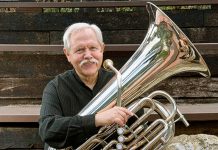
A group of Corona del Mar High School students is striving to change high school culture.
Members of the school’s National Honor Society feel it’s important that students act with honor, respect and integrity. Rather than give in to the pressures of high school, NHS students urge their classmates to make their own ethically conscious decisions. The group is trying to make being a good student and having academic integrity the cool thing to do.
“Our main goal is to promote academic integrity on campus,” said NHS president Lyssa Aruda, a senior.
The qualities the group looks for are scholarship, leadership, service, and character, said staff adviser Marianne Scott.
The National Honor Society has been on campus at CdM since 2006. There are 43 members, juniors and seniors
“I joined NHS because I liked it’s principles,” said board member Blake Myers. “I think it (integrity) is really important, not only in school, but in life as well.”
A lot of students don’t see integrity as something they need to have, Myers said.
The club conducted a survey and found that 75 percent of students on campus saw some variety of cheating every week and 36 percent saw it every day.
To address the issue, the group first sent thank-you notes to the teachers that had taken initiative to prevent cheating.
They also addressed parents and reminded them that the pressure to get good grades can sometimes be overwhelming, said NHS board member Daniel Anastos.
A lot of the NHS members agreed that students seem to place more significance on what grade they get, rather than how they get it.
To help combat the campus-wide problem, the group has been working on what they call the Honor Council, a small committee of students that will arbitrate between the school and a student caught cheating.
“The idea is not to punish students but rather correct their behavior and in ways that aren’t seen as very detrimental, like putting it on their permanent record or something,” Myers said.
It would be made up of students, said NHS board member Alex Turney, and they would try to come up with a solution for the reason behind the cheating rather than a punishment for the act of cheating.
Fellow students might be able to better understand the deeper issues, the reasons behind the cheating, rather than the principal or other adults, he said. Sometimes kids don’t feel comfortable to open up to adults or school faculty, Turney added.
The group is also trying to develop an honor code, which would essentially be a guide to help and encourage students to live honorably, Myers said.
“(It’s an) attempt to change the culture and the (way students are) thinking,” Myers said.
Another way NHS promotes academic integrity is through Integrity Week, one of the projects the group works on during the year.
During Integrity Week, NHS had several anti-cheating projects. They teamed up with the CdM Associated Student Body (ASB) and held a flash mob dance during a break at school. The slogan was “Don’t be shady, have integrity,” Aruda said, and during the week they passed out sunglasses with the slogan printed on the side. They also hung posters around the school promoting academic integrity.
Another of the society’s projects is the book fair, which the group has been doing for three years.
This year, the group collected more than 2,500 books, donated from students, staff and parents from the local elementary schools. The books were sorted by grade level, Scott said, and each child received three books.
NHS members split into groups and designated drop-off areas at each school. They asked the principal of each school how they would like to spread the word about the book fair, said NHS board member Elliott Steele, like flyers, community newsletters or blogs and e-mails.
“Getting books into their homes, that was the goal,” Scott said.
It was exciting to see how interested in reading the kids were, said Cole Satterfield, another board member.
“I think that can help build a really strong foundation for their future,” Satterfield added.
The National Honor Society also helps build the futures of its student members. According to the society’s national website, the organization “not only recognizes students for their accomplishments, but challenges them to develop further through active involvement in school activities and community service.”
“They really are role models,” Scott said. “They’re leaders, setting good examples for the younger students and their own peers (which can be difficult in high school). It requires some courage to be a part of the National Honor Society.”




